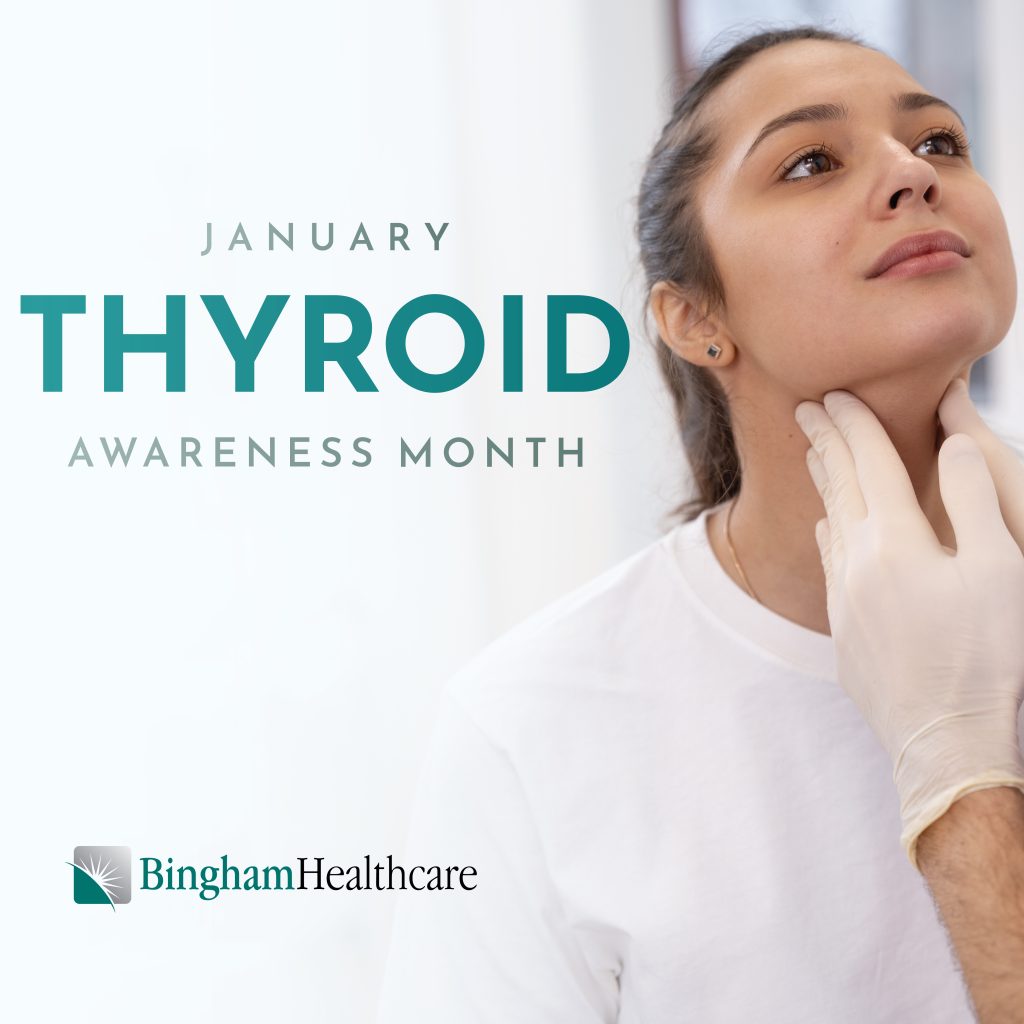
Thyroid Disorder – Detect It, Inspect It, Treat It
January is Thyroid Cancer Awareness Month, which is the perfect time to provide you with some valuable information about the thyroid.
Nestled below your voice box, your butterfly-shaped thyroid gland looks quite innocent. But proceed with caution. Weighing in at less than an ounce, it’s a potential hazard.
Think of it as your body’s accelerator. If it’s not up to speed, your thyroid can leave you feeling exhausted and depressed.
But your thyroid also can shift into overdrive. You feel all revved up, and you didn’t even order a double shot of espresso in your café latte. As your thyroid pumps out excess hormones, your metabolism revs up. An overactive thyroid produces unwanted symptoms as well, from excessive sweating and nervousness to insomnia and hand tremors.
While thyroid disorders are generally easy to treat, they’re also easy to miss or misdiagnose. So before you get caught in one of your body’s common speed traps, use this road map to detect, inspect and dodge possible trouble.
HYPOTHYROIDISM
Detect it: Welcome to life in the slow lane. When thyroid hormone levels are too low, the body’s processes start slowing down. With your body making less heat and energy, you might feel colder, tire easily, gain weight, feel sluggish and suffer from constipation. Hypothyroidism can also take a toll on your appearance, including hair loss (even on your eyebrows), drier skin and brittle fingernails. It can even play havoc with your mood and memory, leaving you forgetful and depressed. Women might suffer from abnormal menstrual periods, either quite heavy or absent.
Inspect It: “Any of these symptoms are a cause to call your doctor, especially if they come on all of a sudden,” says Dr. Angelo Capricchione, who is a fellowship-trained endocrinologist at Bingham Healthcare, and is board certified in the treatment of osteoporosis, diabetes, and thyroid disorders.
Dr. Capricchione says measuring thyroid stimulating hormone (TSH) levels in a sample of your blood is the best screening if you’re having symptoms that might be related to your thyroid. A high TSH level tells you the thyroid isn’t making enough of the hormone thyroxine (T4) and you have hypothyroidism. Even if your thyroid gland can’t work right, thyroxine (T4) replacement can restore your thyroid hormone levels and your body’s normal functioning.
Don’t veer off course: “The symptoms of hypothyroidism can easily be explained away,” explains Dr. Capricchione. “You might be tempted to chalk it up to too much stress, depression or simply getting older.”
NODULES
Detect it: Most thyroid nodules don’t cause symptoms and can’t be seen, so your doctor may be the first to discover one or more during a routine physical exam. But you can be proactive by performing this easy self-exam recommended by Dr. Capricchione: “Stand in front of your mirror, put water in your mouth, look up somewhat and swallow. If it looks like your thyroid goes up and down fairly smoothly, you’re OK. If it looks like one side is bigger than the other, you should see a doctor.” If thyroid nodules cause symptoms, they may include pain in the neck, jaw or ear; difficulty swallowing; a “tickle in the throat”; or shortness of breath if they press on the windpipe.
Inspect it: It’s important to detect nodules to rule out thyroid cancer. (The good news is, most thyroid cancers are curable and rarely cause life-threatening problems.) Screening may begin with blood tests to check whether your thyroid is functioning normally. To detect cancer, specialized tests may be performed, such as a thyroid biopsy, a thyroid scan or a thyroid ultrasound. The American Thyroid Association recommends thyroid cancers be removed by an experienced thyroid surgeon and noncancerous nodules that aren’t removed be watched closely with follow-up examinations every six to 12 months.
Don’t veer off course: Because most thyroid nodules don’t cause symptoms, they easily slip under the radar.
HYPERTHYROIDISM
Inspect it: During a physical exam, your doctor may detect an enlarged thyroid gland and a rapid pulse. Other signs include moist, smooth skin; a tremor in your fingertips; fast reflexes; and enlarged or bulging eyes if you have Grave’s disease (the most common type of hyperthyroidism). Your doctor will confirm the diagnosis of hyperthyroidism with laboratory tests that measure T trouble—unhealthy levels of TSH, T4 and triiodothyronine (T3) in your blood. When the thyroid gland is overactive, TSH levels will be low and the thyroid hormone level in the blood will be high.
Dodge It: While you can overhaul your diet and exercise regimen to dodge diabetes and heart disease, avoiding a thyroid disorder is not so clear-cut. Dr. Capricchione recommends eating a balanced diet. Iodine is essential for the thyroid gland to produce thyroid hormones. If you’re concerned about whether you’re getting enough iodine in your food (eggs and sea products are a good source), take a daily multivitamin that contains the nutrient, but steer clear from kelp tablets and other supplements high in iodine. A lot of iodine can make both an overactive and underactive thyroid worse.
FAST FACTS from the AMERICAN THYROID ASSOCIATION
- More than 12% of the U.S. population will develop a thyroid condition during their lifetime.
- An estimated 20 million Americans have some form of thyroid disease.
- Up to 60% (12 million) of those with thyroid disease are unaware of their condition.
- Women are five to eight times more likely than men to have thyroid problems.
- One in eight women will develop a thyroid disorder during her lifetime.
- Undiagnosed thyroid disease may put patients at risk for certain serious conditions, such as cardiovascular diseases, osteoporosis and infertility.
- Most thyroid diseases are life-long conditions that can be managed with medical attention.
- 20 million have thyroid disease. 12 million don’t even know it. That’s 1 in 25 people are living with a thyroid disorder and don’t even know it!
Thyroid Screening
Angelo Capricchione, MD, is a fellowship-trained endocrinologist at Bingham Healthcare, and is board certified in the treatment of osteoporosis, diabetes, and thyroid disorders. If you think you’re at risk for diabetes or have any thyroid concerns, need a screening, or would like to discuss the management of your diabetes or thyroid condition, please schedule with Dr. Capricchione’s at (208) 785-3865.
He is always welcoming new patients in Blackfoot and Pocatello.
Our content is reviewed regularly and is updated when new and relevant evidence is made available. This information is neither intended nor implied to be a substitute for professional medical advice. Always seek the advice of your physician or other qualified health provider prior to starting any new treatment or with questions regarding a medical condition.


